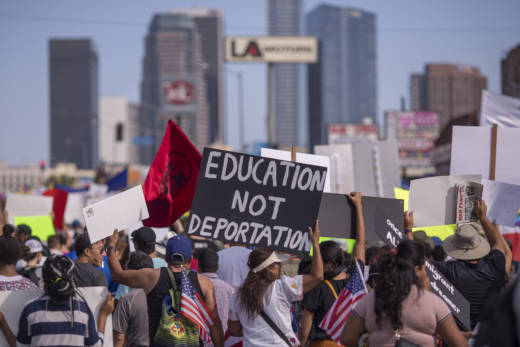Jeffrey Davidson, an attorney representing the governing board of the University of California school system, said people took out loans, enrolled in school and even made decisions about whether to get married and start families on the basis of DACA and now face "horrific" consequences from the loss of the program.
"The government considered none of this at all when they decided to rescind DACA," he said.
Alsup also had tough questions for Davidson.
"Isn't it true that in our country -- a democracy -- that elections have consequences?" Alsup asked. Davidson acknowledged that the Trump administration could end the program, but, he said, it must be done in a more methodical way, with documentation showing that results of the change and alternatives had been considered.
Alsup questioned whether the administration had conducted a thorough review before ending the program.
Brad Rosenberg, a Justice Department attorney, said the administration considered the effects of ending DACA and decided to phase it out over time instead of cutting it immediately.
DACA recipients will be allowed to stay in the U.S. for the remainder of their two-year authorizations. Any recipient whose status was due to expire within six months also got a month to apply for another two-year term.
Rosenberg said DACA was always a temporary measure and never extended any guarantees about the benefits it conferred.
"Perhaps it is worthwhile for Congress to consider the benefits of providing some form of relief to these individuals," he said.
The department said in court documents that DACA was facing the possibility of an abrupt end by court order, but Alsup was critical of that argument.
The program includes hundreds of thousands of college-age students commonly referred to as "Dreamers," based on never-passed proposals in Congress called the DREAM Act that would have provided similar protections for young immigrants.
Fresno resident Deidi Sanchez identified herself as a Dreamer outside the hearing Wednesday. She and other self-identified dreamers who attended the hearing said they felt they were being used as leverage in a congressional debate over immigration enforcement.
"I think it's just a political game that they're playing and putting our lives and our futures at risk," Sanchez said.
She said she had earned bachelor's and master's degrees, started a business and recently bought a home. She works for the Fresno County superintendent of schools.
"I feel like I haven't done anything but contribute positive things to the economy," she said.
Alsup asked several times about the loss of work authorization for DACA recipients if the program ends.
"Those work authorizations are an important thing," he told Department of Justice attorneys. "You're going to throw hundreds of thousands of people into the unemployment line, and they can't even get in the unemployment line."
U.S. Attorney General Jeff Sessions announced in September that DACA would be phased out, saying Obama had exceeded his authority when he implemented it in 2012.
The move sparked a flurry of lawsuits in different federal courts across the country, including one in New York filed by 15 states and the District of Columbia.
Alsup is considering five different lawsuits, including one brought by California and three other states and another by the governing board of the University of California school system.
"Today we continued our work in court to make sure Dreamers can continue to contribute to America," California Attorney General Xavier Becerra said in a statement after the hearing. "We will fight for them with every tool we have."
Alsup had ordered the Trump administration to turn over all emails, letters and other documents it considered in its decision to end DACA, but the U.S. Supreme Court put that order on hold earlier in December.
This post contains reporting from the Associated Press.
